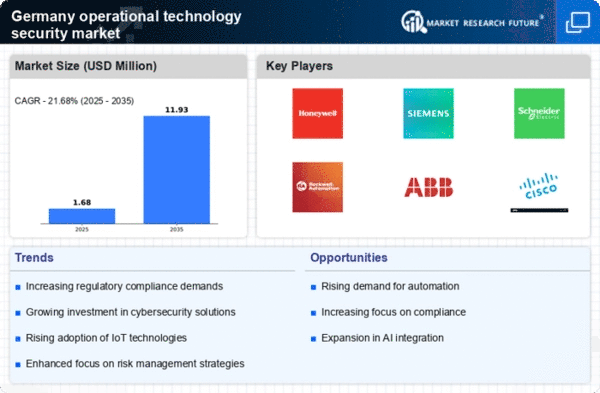Rising Cyber Threats
The operational technology-security market in Germany is experiencing heightened demand due to the increasing frequency and sophistication of cyber threats. As industries become more interconnected, the potential attack surface expands, making critical infrastructure more vulnerable. Reports indicate that cyber incidents targeting operational technology systems have surged by over 30% in recent years. This alarming trend compels organizations to invest in robust security measures to safeguard their assets. The operational technology-security market is thus positioned for growth as companies seek to mitigate risks associated with cyberattacks, ensuring the integrity and availability of their operational systems.
Investment in Smart Manufacturing
Germany's commitment to Industry 4.0 and smart manufacturing initiatives is driving the operational technology-security market. As manufacturers adopt advanced technologies such as IoT and AI, the need for secure operational environments becomes paramount. The market is projected to grow by approximately 25% annually as companies prioritize cybersecurity to protect their smart factories. This investment not only enhances productivity but also necessitates the implementation of comprehensive security frameworks to address vulnerabilities inherent in connected systems. Consequently, the operational technology-security market is likely to see increased activity as organizations strive to balance innovation with security.
Government Initiatives and Funding
The German government is actively promoting cybersecurity through various initiatives and funding programs aimed at enhancing the operational technology-security market. With a focus on protecting critical infrastructure, the government has allocated substantial resources to support research and development in cybersecurity technologies. This includes funding for public-private partnerships that aim to bolster the security posture of operational technology systems. As a result, the operational technology-security market is expected to benefit from increased investment and collaboration, fostering innovation and improving the overall security landscape in Germany.
Integration of Compliance Standards
The operational technology-security market in Germany is influenced by the integration of compliance standards that govern cybersecurity practices. Regulatory frameworks such as the NIS Directive and the GDPR impose stringent requirements on organizations to protect sensitive data and ensure the resilience of critical infrastructure. Compliance with these standards necessitates the adoption of advanced security measures, thereby driving demand within the operational technology-security market. As companies strive to meet regulatory obligations, they are likely to invest in comprehensive security solutions, further propelling market growth.
Growing Awareness of Cybersecurity Risks
There is a notable increase in awareness regarding cybersecurity risks among organizations in Germany, which is positively impacting the operational technology-security market. Companies are recognizing the potential financial and reputational damage that can arise from security breaches. This awareness is prompting businesses to prioritize cybersecurity training and awareness programs for their employees. As organizations invest in building a security-conscious culture, the operational technology-security market is likely to expand, driven by the demand for solutions that address human factors in cybersecurity.
















